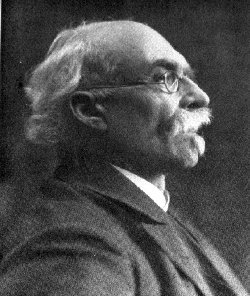- Hans Vaihinger
Infobox_Philosopher
region = Western Philosophy
era =20th-century philosophy
color = #B0C4DE
name = Hans Vaihinger
birth =September 25 1852 (Nehren)
death =December 18 1933 (Halle)
school_tradition =Neo-Kantianism
main_interests =idealism ,positivism
influences =Immanuel Kant ,Arthur Schopenhauer ["Schopenhauer's love of truth was a revelation to me." "The Philosophy of As–If", p. xxix.] ,Friedrich Nietzsche
influenced =Alfred Adler
notable_ideas =fictionalism ,instrumentalism ,nominalism Hans Vaihinger (
September 25 ,1852 –December 18 ,1933 ) was a German philosopher, best known as a Kant scholar and for his "Philosophie des Als Ob" ("Philosophy of As If"), published in 1911, but written more than thirty years earlier. [Loewenberg, J. Untitled Review. "The Journal of Philosophy, Psychology and Scientific Methods", Vol. 9, No. 26. (Dec. 19, 1912), pp. 717-719.]Vaihinger was born in
Nehren, Württemberg , Germany, nearTübingen , and raised in what he himself described as a "very religious milieu". He was educated at Tübingen,Leipzig , andBerlin , became a tutor and later a philosophy professor atStrasbourg before moving to the university at Halle in 1884. From 1892, he was a full professor.In "Philosophie des Als Ob", he argued that human beings can never really know the underlying reality of the world, and that as a result we construct systems of thought and then assume that these match reality: we behave "as if" the world matches our models. In particular, he used examples from the physical sciences, such as
proton s,electron s, andelectromagnetic wave s. None of these phenomena have been observed directly, but science pretends that they exist, and uses observations made on these assumptions to create new and better constructs.This philosophy, though, is wider than just science. One can never be sure that the world will still exist tomorrow, but we usually assume that it does.
Alfred Adler , the founder of Individual Psychology, was profoundly influenced by Vaihinger's theory of fictions, incorporating the idea of psychological fictions into his personality construct of afictional final goal .Frank Kermode 's "The Sense of an Ending" (1967) was an early mention of Vaihinger as a useful methodologist of narrativity.Later,
James Hillman developed both Vaihinger and Adler's work with psychological fictions into a core theme of his work "Healing Fiction" in which he makes one of his more accessible cases for identifying the tendency to literalize, rather than "see through our meanings," ("HF" 110) with neurosis and madness.Works
* 1876 "Hartmann, Dühring und Lange" ("Hartmann, Dühring and Lange")
* 1897-1922 "Kant-Studien ", founder and chief editor
* 1899 "Kant — ein Metaphysiker?" ("Kant — a Metaphysician?")
* 1902 "Nietzsche Als Philosoph" ("Nietzsche as Philosopher")
* 1906 "Philosophie in der Staatsprüfung. Winke für Examinatoren und Examinanden." ("Philosophy in the Degree. Cues for teachers and students.")
* 1911 "Philosophie des Als Ob" ("Philosophy of "As If", translated byC. K. Ogden , 1924)
* 1922 "Commentar zu Kants Kritik der reinen Vernunft" ("Commentary on Kant'sCritique of Pure Reason "), edited byRaymund Schmidt References
External links
* [http://www.kant.uni-mainz.de/ks/history/adair-toteff.html Biography of Vaihinger in English]
* [http://homepages.uni-tuebingen.de/gerd.simon/chrvai.pdf Extremely detailed German-language chronology of Vaihinger's life, works, and works about him.]
Wikimedia Foundation. 2010.
